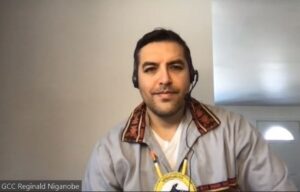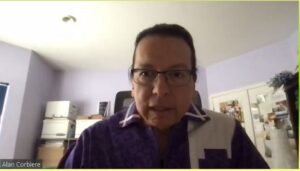Animals, water, land and climate – everything is connected

By Kelly Anne Smith
ANISHINABEK NATION TERRITORY — The Anishinabek Nation hosted the 6th Annual Lands, Resources and Economic Development Forum: Kina-Gego-Naabadosin— Everything is Connected from February 15-17 virtually via Zoom.
The Forum was largely focused on climate change as Anishinabek Nation leaders seek nation-to-nation consultation in preparation for a Net-Zero future. Resource revenue sharing is also crucial to the Leadership Panel.
Anishinabek Nation Grand Council Chief Reg Niganobe states during Day 1 of the Forum that with resource extraction historically bringing few benefits to First Nations, policy discussions should be switched to negotiations based on Treaties.
“We do have parameters in our Treaties to discuss a lot of issues. We’ve been doing that for hundreds of years now. Our Treaty partner (province) has strayed away from that path. It is vital that our First Nations are heard and have an equal voice.”
Lake Huron Regional Deputy Grand Council Chief Travis Boissoneau says the process is one-sided.
“We don’t control how and when resources are being extracted. We don’t control the location and what type of resources because we don’t control the mining permits. We have to assert what we want from resource revenue sharing. Financial health and wealth are great but the way a lot of our communities operate, we prefer to have our land longer than financial resources.”
Northern Superior Regional Deputy Grand Council Chief Melvin Hardy says a lot of mining activities take place in his region.
“It’s increasing, especially around Lake Nipigon and the north shore of Lake Superior. The industry really roughs up the land. When we talk to mining companies, they seem to be supported by the provincial government. They can dictate what they want to do,” he explains. “We’ve got the prospectors running across our lands. Then they do consultation by the click on a computer online and the First Nations don’t even know. Right then, with the intent, that’s when the First Nation should be contacted.”
The Anishinabek Nation Councils panel weighed in on climate change with Elders informing of environmental changes in their lifetime.

Getzidjig Advisory Council Northern Superior representative Mishomis James Mishquart is a citizen of Biinjitawabik Zaagiing Anishinabek.
“For thousands of years, in Turtle Island, our people have lived off the resources of the land,” he shares. “At one time, our people lived long lives. It wasn’t uncommon to see a lot of our Elders to be well into their nineties, even a 100 years old. It has a lot to do with the diet. Even our animals are feeling it too. There used to be a place we would go get our sturgeon, there was no sturgeon there. The beavers chased the sturgeon out of there because the beaver’s habitat was threatened.”
Lance Copegog speaks as a Southeast representative of the Eshkeniijig Advisory Council and believes that First Nations need to be proactive on climate change to ensure resiliency.
“Combating it, and develop ways that we can prepare for that. As young people, we can provide a role in providing our leadership with recommendations and articulating that vision for the future. We all agree 100% that our lands need to be protected and our waters need to be protected and our resources need to be protected.”
Water, trees and the land are threatened by over 400 Invasive species in Ontario. Guest speaker Sarah Rang is the executive director of the Invasive Species Centre. She informed participants and viewers of invasive species spreading with new highways, new utility corridors and disturbed lands, and that climate change increases their spread. Rang says invasive species block land corridors and water access used by animals, hunters and fishers.

Day 2 of the Forum had York University History Professor and M’Chigeeng First Nation member Alan Corbiere sharing a teaching on the Dish with One Spoon Wampum Belt.
“When it’s a dish with one spoon, then you have to take time and care to take turns with one dish and one spoon. But if you have a lot of ladles around there, then many people will come.”
Corbiere says the Dish with One Spoon teachings is used in community feasts when a Spirit Plate is set aside for the ancestors to feed the Spirit and also in two ways in a clan feast.
“One, you make one separate dish for them. The other is when everyone puts a bit from their own dish into one pot, so you are literally sharing back,” he explains. “We think of this Dish with One Spoon as the land. We’ve taken from the land, all of us. Many of us now also know we are giving thanks when we do that.”
He adds that Rick Hill, Tuscarora of the Six Nations, has an environmental ethics lens.
“That we care for that land, that we don’t do anything destructive to it, and we try not to dirty it or pollute it, that means the land, and that everyone else has access to it. In a sense, this teaching is don’t be stingy and to share.”
The Westaway Law Group spoke of work with traditional teachings and knowledge across Canada and work on food security and how the impacts of climate change has on our nations.
“We’ve worked with the Anishinabek Nation on some bigger cases, going to the Supreme Court making sure they spoke up on big issues like climate change,” says Cynthia Westaway, adding that the Crown must have a plan to assess for cumulative impacts. “How can we change the law and the policies of the Crown to better recognize that they have to have tools to look at it more globally and the impact in the entire region?”
Government representatives updated the Forum on grants and programs available to First Nations.
On Day 3, Training for Resiliency was presented by Ashley Russell-Taylor, the Fire Chief and Community Emergency Management Coordinator of Six Nations of the Grand River First Nation.
Ali English, Executive Director of Ecological Farmers Association of Ontario (EFAO) covered agricultural methods for adapting to climate change. She pointed to keeping the soil covered with crop covers and reducing tillage to sustain good soil quality, especially during low rainfall.
Tiffany Traverse, an Indigenous farmer and Wildfire Assistant with British Columbia Wildfire Service followed. She works on a decolonized approach to soil health research.
An in-camera session of the Anishinabek Nation Caucus ended the Forum.
Mother Earth Drum by Gtigaaning Singers Blair Beaucage, Zachary Beaudette, and Tory Fisher opened and closed the event after a smudge by Gookmis Elder Evelyn McLeod of Nipissing First Nation.


